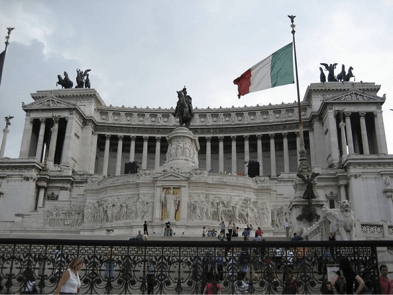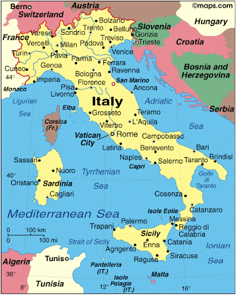
Italy’s Società a Responsabilità Limitata (Srl) is the Italian version of a “Limited Liability Company” (LLC). As such, it is a separate legal entity from its shareholders and owners.
Many foreigners invest in the Italian tourism, agriculture, and manufacturing industries. So, as an incentive, Italy provides low interest business loans, investment grants, and government guarantees for exports.
Background
Italy is located in southern Europe on the Mediterranean Sea. It is officially called the “Italian Republic.” Its open lands borders Austria, France, San Marino, Slovenia, and Switzerland.
Its political structure is described as a “unitary parliamentary republic.” Therefore, it has an elected two house parliament, prime minister and a president.
Benefits
An Italian Società a Responsabilità Limitata (Srl) offers the following benefits:
• Complete Foreign Ownership: Foreigners may own all of the shares in the Srl.
• Limited Liability: A shareholder’s liability is limited to his or her subscribed share capital value.
• Fast Registration: Once all documents are filed, registration and approval can be accomplished in two working days.
• Reasonable Capital: The minimum share capital is 10,000 Euro.
• One Shareholder: One shareholder is permitted but with unlimited liability. Two shareholders obtains limited liability.
• One Director: One director who is an EU resident is permitted.
• No Audits: Small companies do not require audits.
• EU Member: Italy is a member of the European Union (EU) affording opportunities with doing business with other EU members.
Italian Società a Responsabilità Limitata (Srl) Name
The SRL must select a unique company name from all other companies in Italy. The company name can be in any language based upon the Latin alphabet. Proposed company names may be checked with the Italian Commercial Registrar for their availability before applying. Company names may be reserved for up to 10 days.
The company name must include either the words “Società a Responsabilità Limitata” at the end or its abbreviation of “S.RL.”.
Limited Liabilities
The shareholders of a Srl liabilities are limited to the value of their subscribed share capital of the company.
A minimum of two shareholders is recommended for limited liability as a “Società a Responsabilità Limitata”. That’s because a single shareholder company known as a “Società Uninominale” will have unlimited liability.
Registration
The Italian Business Register (Registro Imprese) handles all applications for new companies. This office is known as the “Register of Companies” (Public Registrar). The required documents for filing include:
• Company name;
• Memorandum of Association and the Articles of Association;
• Local bank’s Certificate of Deposit verifying the minimum 25% of the share capital deposit; and
• Signed (by the company director) Chamber of Commerce form.
Upon approval, the Public Registrar issues a Deed of Incorporation.
This process and approval may take up to two business days.
After receiving the Deed of Incorporation, within 30 days the Srl must register with the Register of Enterprises. This Register informs all government agencies (Tax Authorities, INAIL, and INPS) and issues a fiscal code number which is used to pay all taxes, social security, and as the VAT number.
Business may be initiated upon receiving the Deed of Incorporation as the fiscal code number is only used for payment of taxes and the VAT.
This entire process is estimated to take up to two weeks.

Shareholder
Srl’s must have at least one shareholder. As mentioned above, a single shareholder company has unlimited liability while two or more shareholders provides limited liability protection. Therefore, a minimum of two shareholders is recommended.
No restrictions exist against a shareholder’s nationality or place of residence. Natural persons or corporate bodies may be shareholders.
The names of every shareholder is recorded at the Public Registry making them available for public inspection. Every shareholder must possess a fiscal code identity number.
Director
Only one director is required to be appointed to manage the Srl. Directors can be of any nationality and reside anywhere. However, at least one director must be an EU resident.
Every director must possess a fiscal code (codice fiscale) number. The names of all directors will be included in the public records available to the public.
Registered Agent
Every Srl must appoint a local registered agent whose office may become the registered office as well.
Minimum Capital
Minimum authorized share capital for a Srl is 10,000 Euro. Srl’s must deposit the minimum 25% with a local bank prior to the Deed of Incorporation being issued. The bank then issues a Certificate of Deposit verifying the minimum 25% share capital deposit to be included with the registration documents with the Public Registry.
However, single shareholder companies must pay the entire share capital in full prior to registering as a new Srl.

Taxes
The current corporate tax rate on profits is 24%. The former rate of 27.5% was reduced effective January 1, 2017.
The government provides a deduction for providing more investment capital than the company requires where the surplus can be deducted from the taxable income.
Note: U.S. taxpayers and everyone subject to taxes on their world income must report all income to their tax authorities.
Accounting
Srl’s are required to file annual returns. Companies classified as “small” do not have to have their accounts and return audited.
Srl’s are also required to maintain proper accounting records. In addition, they must keep a register of officers at the registered office.
Time for Registration
Expect the entire registration process and approval to take up to two weeks. However business may be initiated within two working days once all of the required documents are ready for filing.
Shelf Companies
Shelf companies are not available for purchase in Italy.
Conclusion
An Italian Società a Responsabilità Limitata (Srl) has these benefits: total foreign ownership, fast registration, limited liability, one shareholder, one director, reasonable minimum capital, no audits, and EU membership.


